Transcending
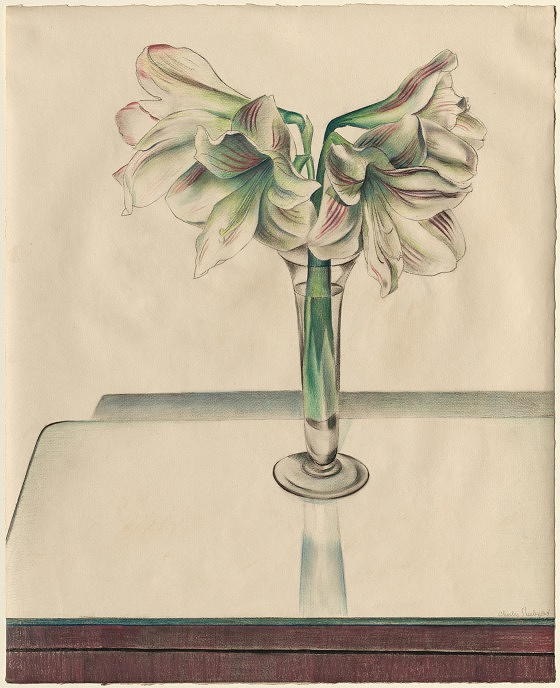
Charles Sheeler: Amaryllis (1924)
"I can see a transparent shadow of myself …"
Practicing seems like a primitive form of what this performer intends when he picks up his instrument. Initially, I struggle to just remember the progressions and to propel myself to the end of each piece, but later, after some considerable time spent immersing myself into these mysteries, my practice shifts. After, it becomes easier if not precisely easy, more expression than re-creation. I often catch myself improvising then, as if I no longer seek to resurrect or recreate, but to manifest a feeling for which the original words and music were always mere indexes, means to access a sense more than the purpose of practicing or an end unto themselves. This after space I enter amounts to Transcending, I guess. It certainly feels like a religious experience, if that description doesn't put too orthodox a spin on it. I leave refreshed and slightly light-headed, eyes clear and voice phlegm-less for a welcomed change. I feel high, as though I'm floating slightly above my former existence, witness to my experience more than mere actor.
I'm seeing that the purpose of this SetTheory experience was less about resurrecting my songbook than about rediscovering Transcending.
Spectacular
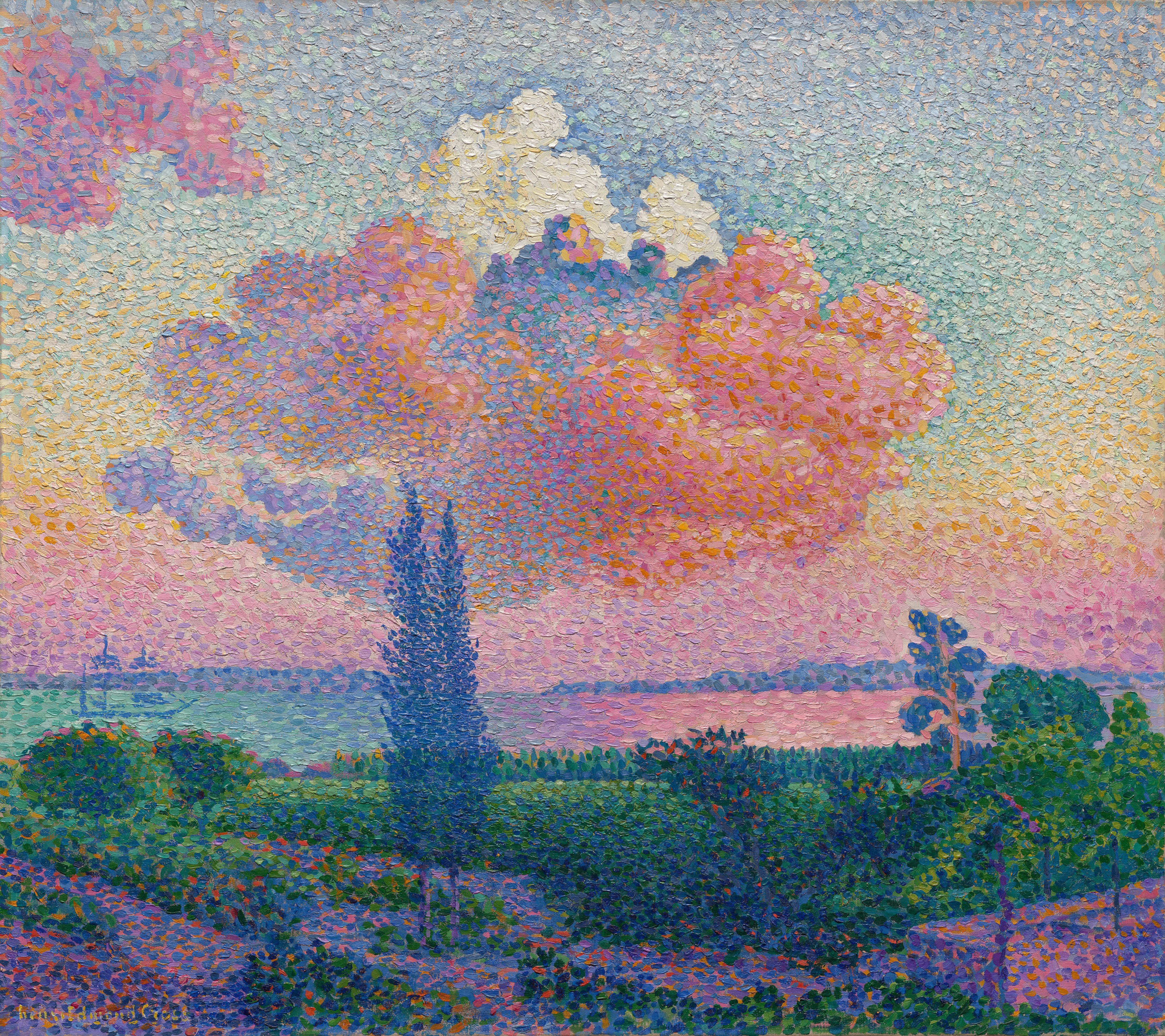
Henri-Edmond Cross: The Pink Cloud (c. 1896)
"Her forbearance might well be remembered …"
The Muse's oncologist reported that her "numbers are Spectacular," an uncharacteristic characterization from any practicing physician. They're professionally more restrained, less effusive. On good days, they might allow themselves to express guarded optimism and, always, unshakable support, but they only rarely enter the unconditional superlative realm. I ask a follow-up question and receive a more sobering perspective in return. I note that her tumor had become invisible on the last scan we saw. He cautioned us to take such visual evidence, however seemingly reassuring, with a grain of salt. He explained that this cancer's cells remain unbelievably tiny, that we can only visually verify their presence when they're present in the billions. A few hundred million of them cannot be seen by even the most sophisticated scanning technology. Visual verification's virtually impossible. We're poking sticks into darkness, he explains.
I thanked him for blunting my enthusiasm, and I meant it.
FinalPrep
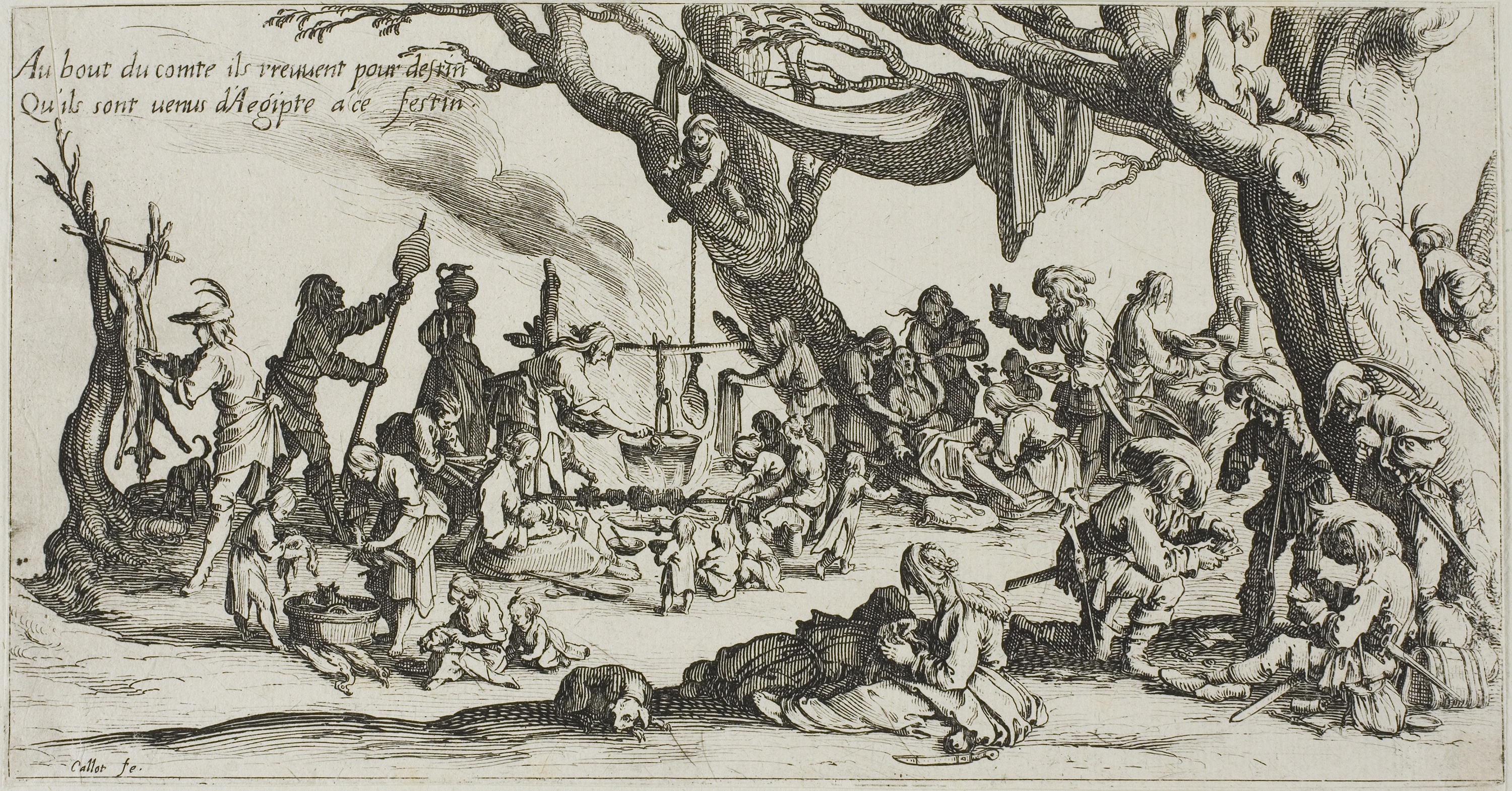
Jacques Callot: Camping Place of the Gypsies:
The Preparation of the Feast
(Artist's working dates 1612–1635)
"I figure I can finish FinalPrep in the final fifteen minutes before I take the stage."
The National Weather Service predicted snow by early evening and the sky had already started spitting fine ice by the time I returned from an errand across town. I wanted to finish cleaning up the latest leaf fall before this storm hit, since the weather service also predicted a week of very cold temperatures with intermittent snowfall providing no later opportunity to complete the last of the Autumn chores before an early Winter settled in. I faced the choice of working through the icy rain or just accepting that I would fall short of my aspirations this season. I slipped into my overalls and stepped out into the weather. As usual, once imbedded within it, the drizzle seemed less ominous. I focused upon quickly removing those leaves and soon found myself finished. Then came the piddling around time.
The Muse swears that she can complete a month of unfinished business in the final few hours before she leaves on an extended trip.
MakingPerfect

Vincent van Gogh: Self-Portrait (1887)
"Will we poison ourselves with critical mediocrity or with generous perfection?"
I ordinarily cannot countenance mention of perfection, for as the owner of both an aging home and body, I see little day-to-day evidence of its existence. I'd come to think of perfection as a poisonous notion. As an objective it seemed to guarantee frustration and failure. As a representation, it seemed falsely overbearing, a transparently misleading characterization. Few experiences greater frustrated me than a shopgirl mindlessly parroting everything I'd mention with a "Perfect!" exclamation. She'd ask me if she could help me with anything. I'd decline her offer and she'd declare our encounter somehow "Perfect!" I'd pray that she might somehow pull her faux enthusiasm to the curb and join the rest of us down here on the surface of the planet Earth rather than continue inhabiting her alien-seeming stratosphere above. I found her realm annoying in the extremis.
But I think I might have groused a tad too much.
PlayForWork
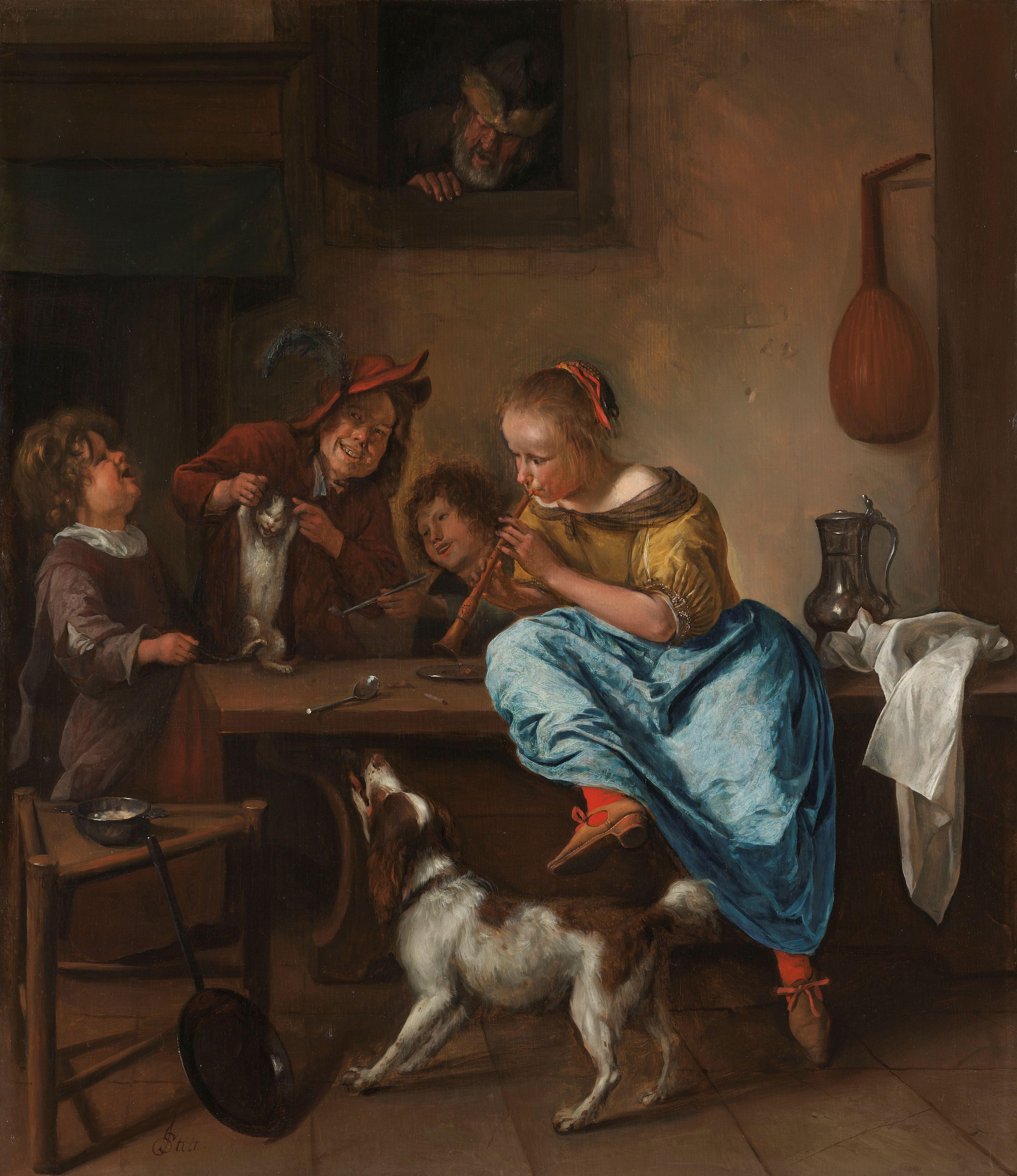
Jan Havicksz. Steen:
Children Teaching a Cat to Dance,
Known as ‘The Dancing Lesson’ (1660 - 1679)
"Maybe mastery makes fun of everything."
Early on, I imprinted on the idea that work really should be play. I sensed that the term work mischaracterized its own possibility, creating a false and disastrous dichotomy. Work might not necessarily be the opposite of play, but the very highest example of it. Mischaracterize that high-order play as work, and people might primarily engage in it to earn time away. Folks might day-dream of retirement rather than reveling in the very embodiment of what they might have been dreaming to achieve. In this way, the carrot became the stick and people started consenting to investing their time in productive but meaningless activities. Some even agreed to become professionals and a few of those consented to become responsible, and before anyone knew it, adulthood had gone to Hell without even the comforting benefit of handbaskets.
When work becomes play, it gets easier to get through the day.
Begetting
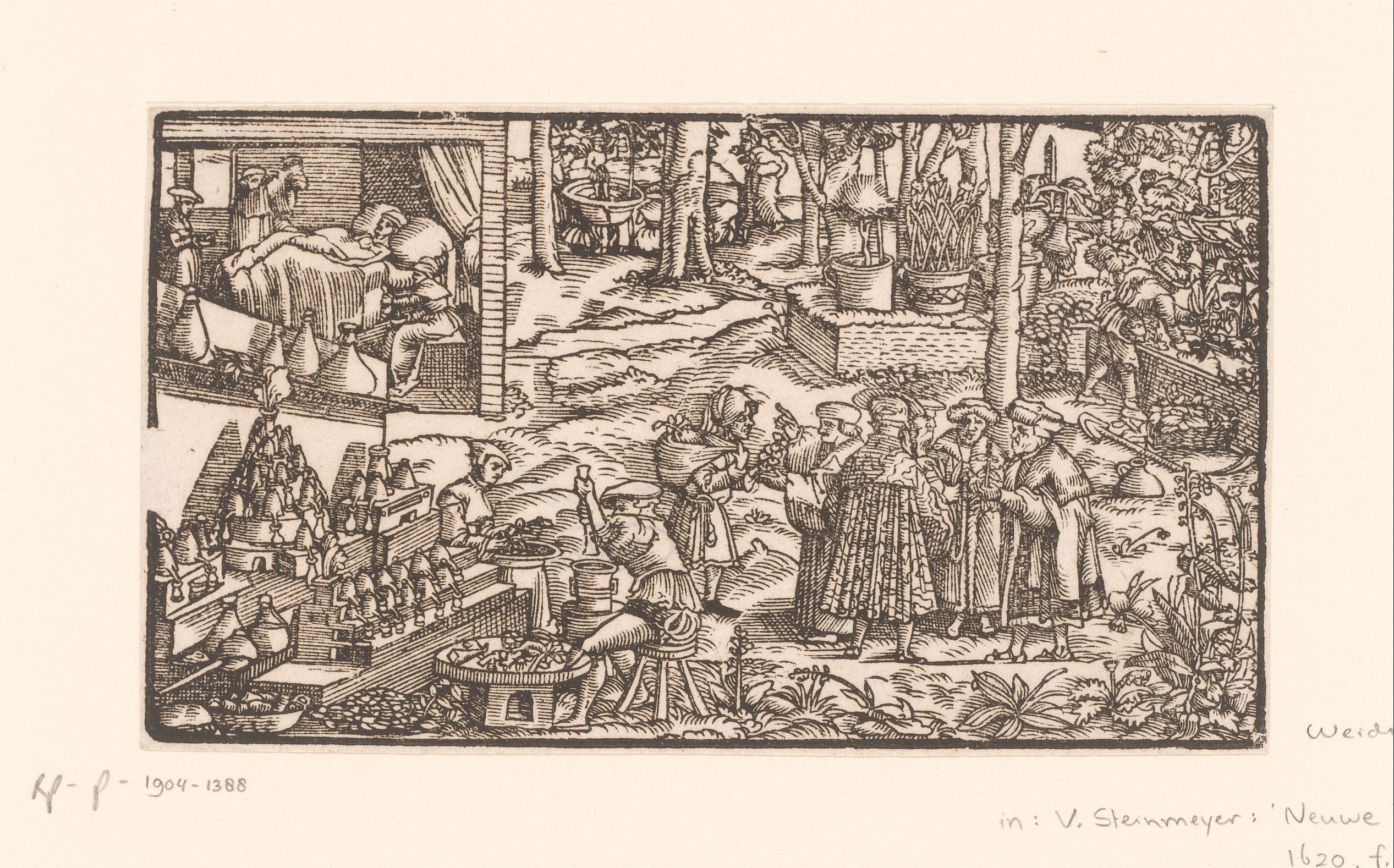
Hans Weiditz (II) (possibly):
Het produceren van wijn en andere medicinale dranken
(Producing wine and other medicinal drinks) (1620)
"… continued Begetting regardless …"
I felt shocked when The GrandOther, sitting at our Thanksgiving table, was the one insisting that we each express our thanks for something. We're no Norman Rockwell image of any holiday family, not even piss poor Presbyterians when it comes to the iconic rituals of any holiday table, yet there was The Other, the youngest at the table, insisting that tradition be acknowledged and performed. Lord (or somebody) knew that we had plenty to feel thankful for, even though this has been a difficult year. I heard myself insist that the hardest years seem to produce the greater volume of gratitude, and not just that they're over. As a blessings generator, hard times just seem better at Begetting blessings, an apparent paradox often lost on those trudging on their knees through the harder of the hardest times. Like with all religious convictions, I guess, the blessings emerge later as reward or punishment, their eventual existence a matter of faith until they manifest.
The question comes, then, how one might reliably induce gratitudes.
PlagueWinter

Arthur Wesley Dow: Marsh Creek (c. 1905)
"The future sure seems lonely."
As we enter the third successive PlagueWinter, I find little evidence that I've fully incorporated any learning from the experience. I still pine and plan as if this disease were little more than a passing inconvenience rather than endemic, as it surely has become. I'm just starting to understand that this disease will most likely haunt my remaining days here, even if I live for decades. Gratefully, neither The Muse nor I have yet contracted this bug, though her son has been through three bouts of it and has been wrestling with long Covid symptoms for two years, since he started recovering from his first bout. A friend just finally tested negative after an eight day run with his second infection this season, and he took Paxlovid just as soon as he tested positive both times, and had just the week before received his latest booster. He said it was like having a bad cold. Of the ten people who attended his ukulele group, two apparently came already infected and six of the remaining eight tested positive the next day. Covid-19 remains alarmingly infectious, though apparently not nearly as deadly as it once was for many.
I've been dreaming of a 'normal' Christmas season, similar to the ones I used to know.
Permitting
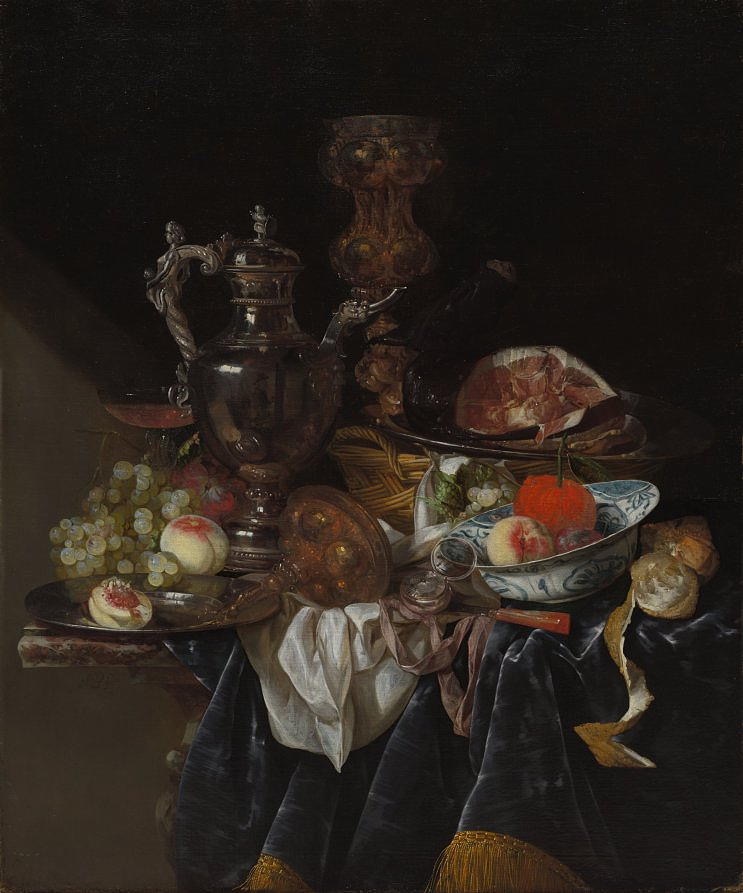
Abraham van Beyeren:
Silver Wine Jug, Ham, and Fruit (c. 1660–66)
"The creative arm wrestles with himself."
The Muse and I decided years ago that we would one day replace the railing that once graced the Villa's front porch roof deck. The old one was destroyed by an enthusiastic—some insist overly-enthusiastic—wisteria, which strangled and ultimately wrestled it to the ground. Our carpenter Joel agreed to perform the deed once we'd resolved the definite tilt the leading edge of that roof had shown over time. The brick pillars supporting that roof were filled with compression fractures, and the roof line's far end had been sinking. The roof supports needed replacing, a massive undertaking involving taking down six tall brick columns and fifty feet of brick foundation wall, repouring foundation, then replacing those columns with concrete, steel, and wood while leveling the roof's leading edge. This work was no superficial paint job, but one which would involve Permitting, that chronically over-worked and misunderstood city department seemingly dedicated to frustrating every intention.
We'd naively presumed that the critical path to completing this transformation would lie along the line of acquiring skilled craftspersons.
Burnishing
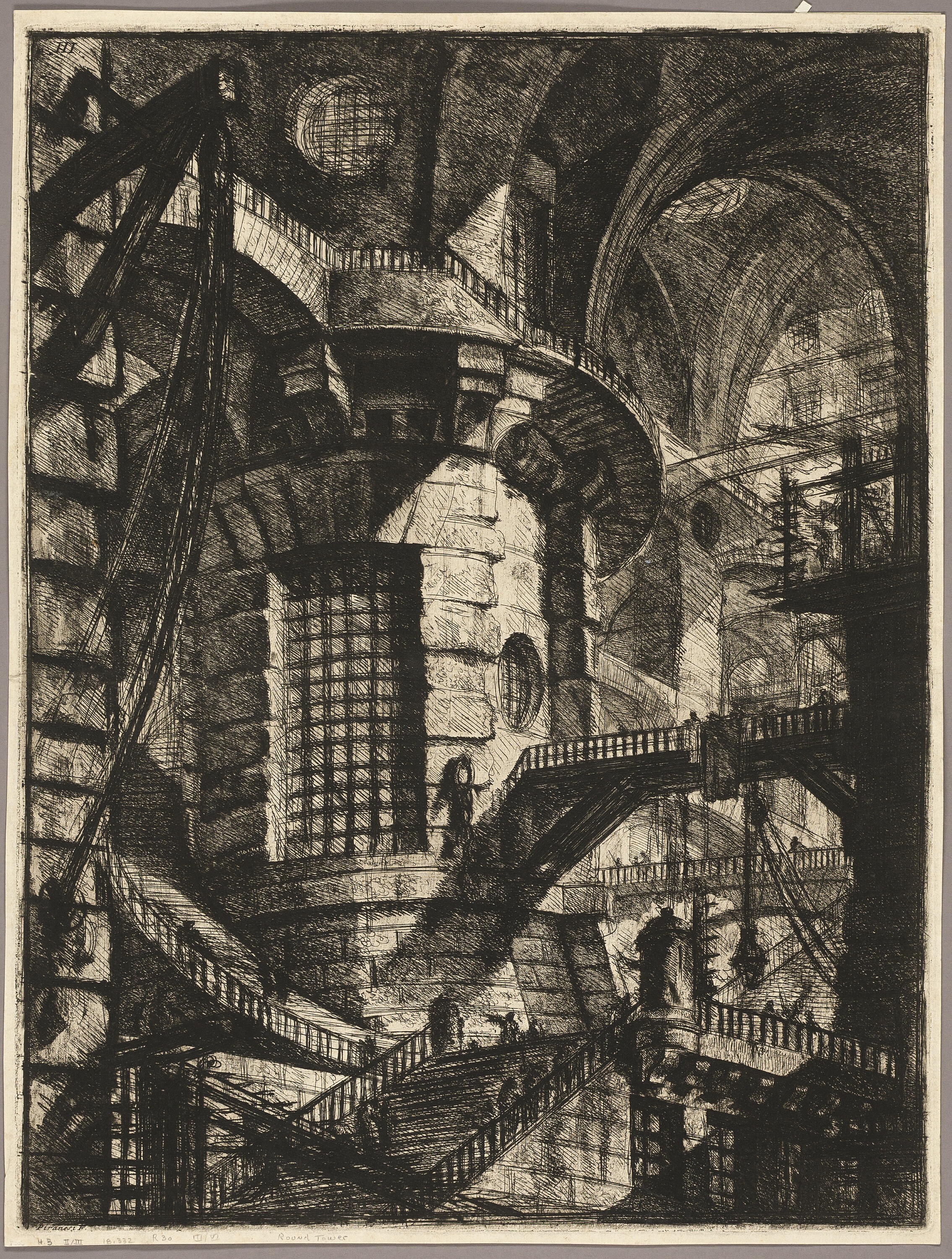
Giovanni Battista Piranesi: The Round Tower,
plate 3 from the second edition of Carceri d’invenzione (Imaginary Prisons)
1750, reworked 1761)
" … each day brings us one day closer …"
Entering her sixth week of cancer treatment, The Muse descended into the worst experiences so far. The week following her final radiation treatment brought by far her body's most extreme reactions. Her neck, which had previously shown some minor evidence of tanning, took to Burnishing in the absence of fresh insults, turning a deep mahogany red and leaving her in intermittent agony. Sleep at times became as difficult as swallowing. Sneezing could prove devastating. Coughing became essentially constant. Food either tasted like nothing or like garbage, and she was hard-pressed to decide which was worse. A few suppers went uneaten, but she could choke down most, if much more slowly and in smaller portions. Oatmeal remained the most reliable meal. She made herself the most marvelous flan, which seemed to mirror the color of her neck and the texture of her throat.
Her sister sent her some THC gummy bears which reliably induce sleep and munchies!
Knotting
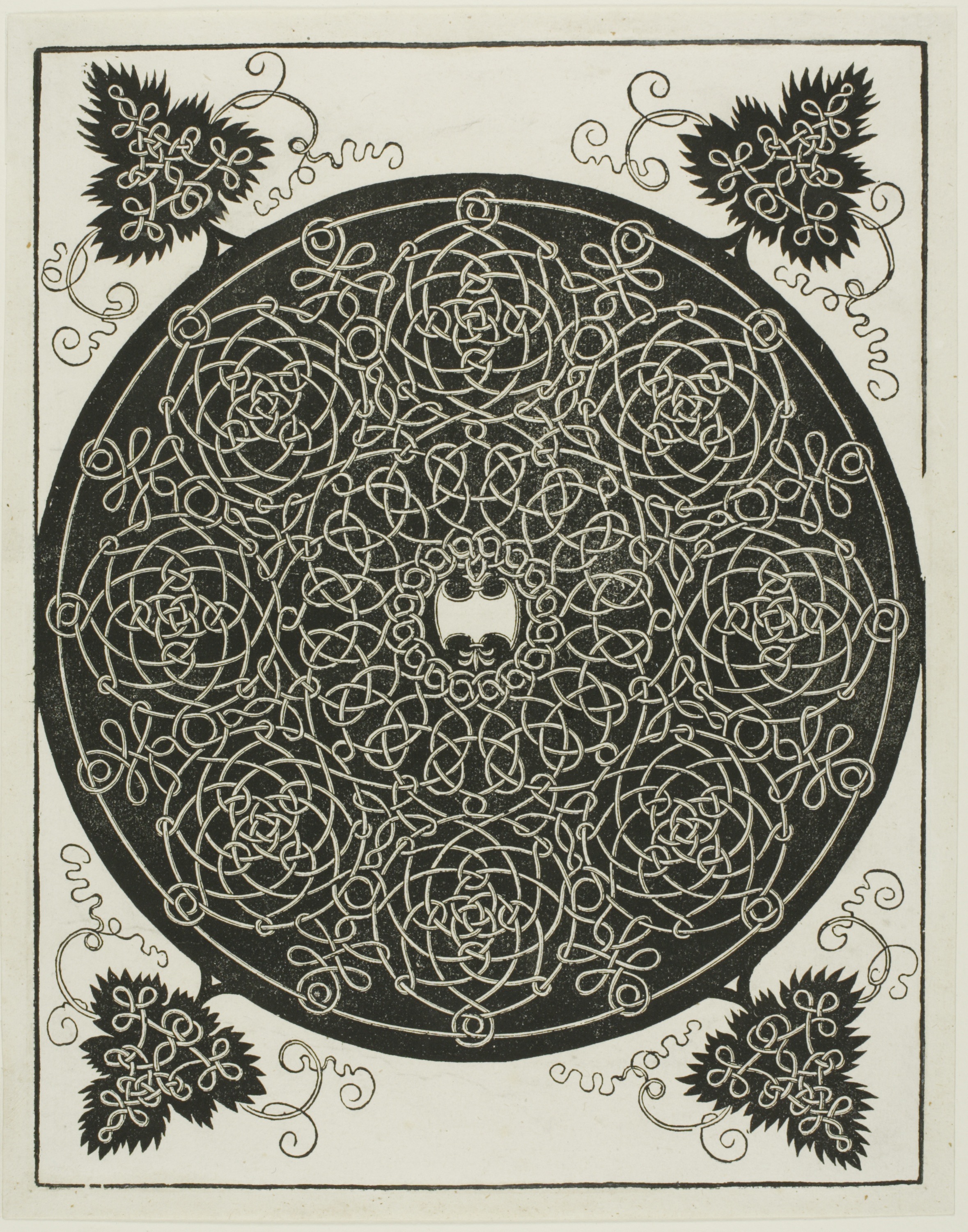
Albrecht Dürer: The Fifth Knot (c. 1507)
" … to grow more familiar with my knots …"
It might be most common to think of one's self as an untier of knots, but I'm thinking just how complicating that characterization inevitably becomes. Those of us guitar players who scrupulously maintain closely-cropped fingernails find ourselves at a natural disadvantage if we consider ourselves untyers. Many others hold no particular interest in solving puzzles, merely finding them frustrating and so best avoided. No, I'm growing to appreciate that I'm naturally more of a knot tyer. My legacy, if I ever deign to have one, should probably be comprised of knots neatly tied, suitable for untying should anyone feel so moved, but otherwise perfectly fine unresolved.
Preparing my SetList songs for public performance, I almost fell into the terrible trap of believing that I would necessarily need to resolve each mystery I encountered when resurrecting every song. …
MakingTheBest
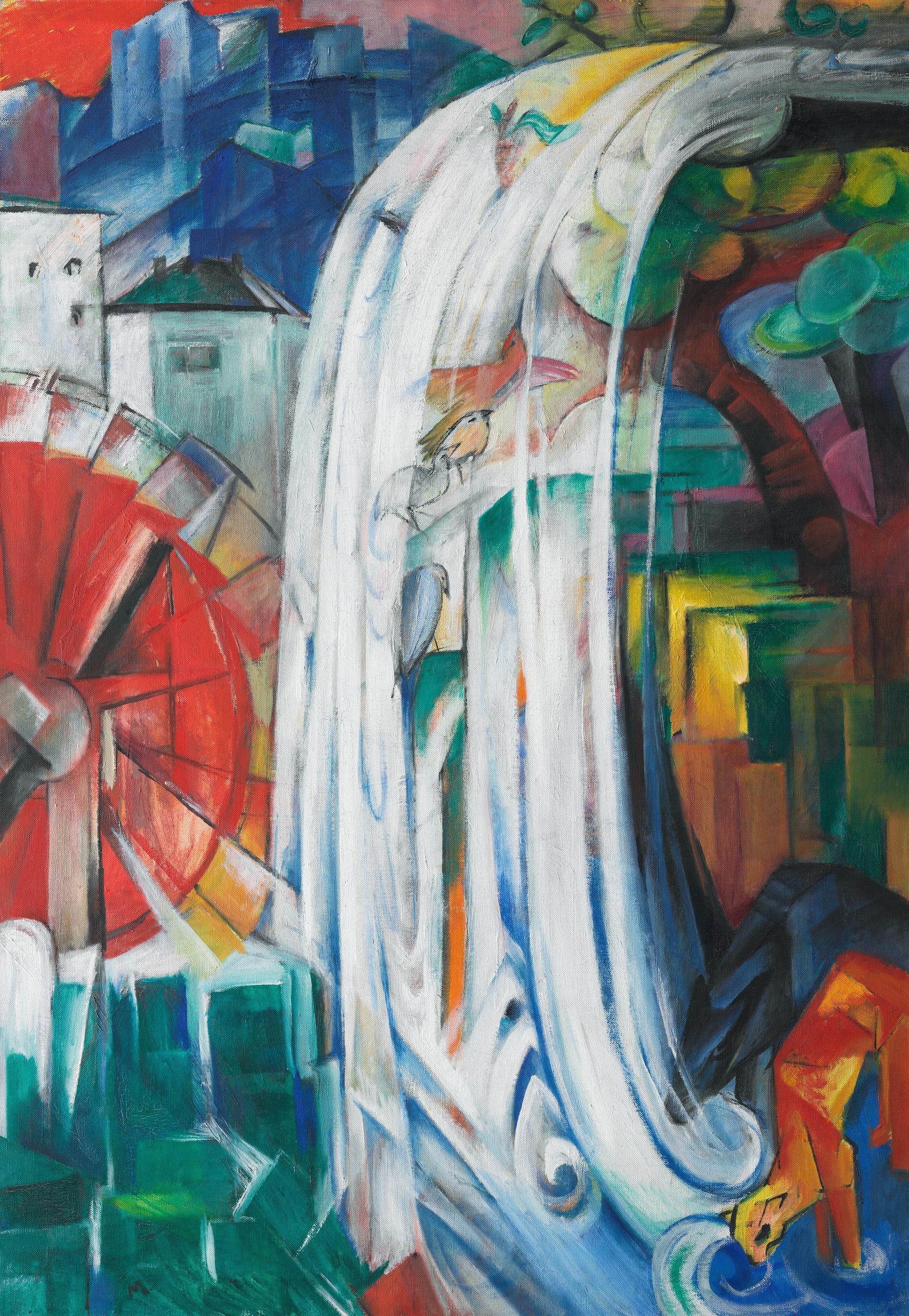
Franz Marc: The Bewitched Mill (1913)
" … once existed forever."
Make The Best
"Make The Best of the curious choices
life brings you.
They won't always rhyme
and they won't always leave a reason behind them,
'cause this is a sloppy opera and a stupid ballet
and if it isn't for the best
at least it is forever."
I always use this song to end my performances.
Innerfacing
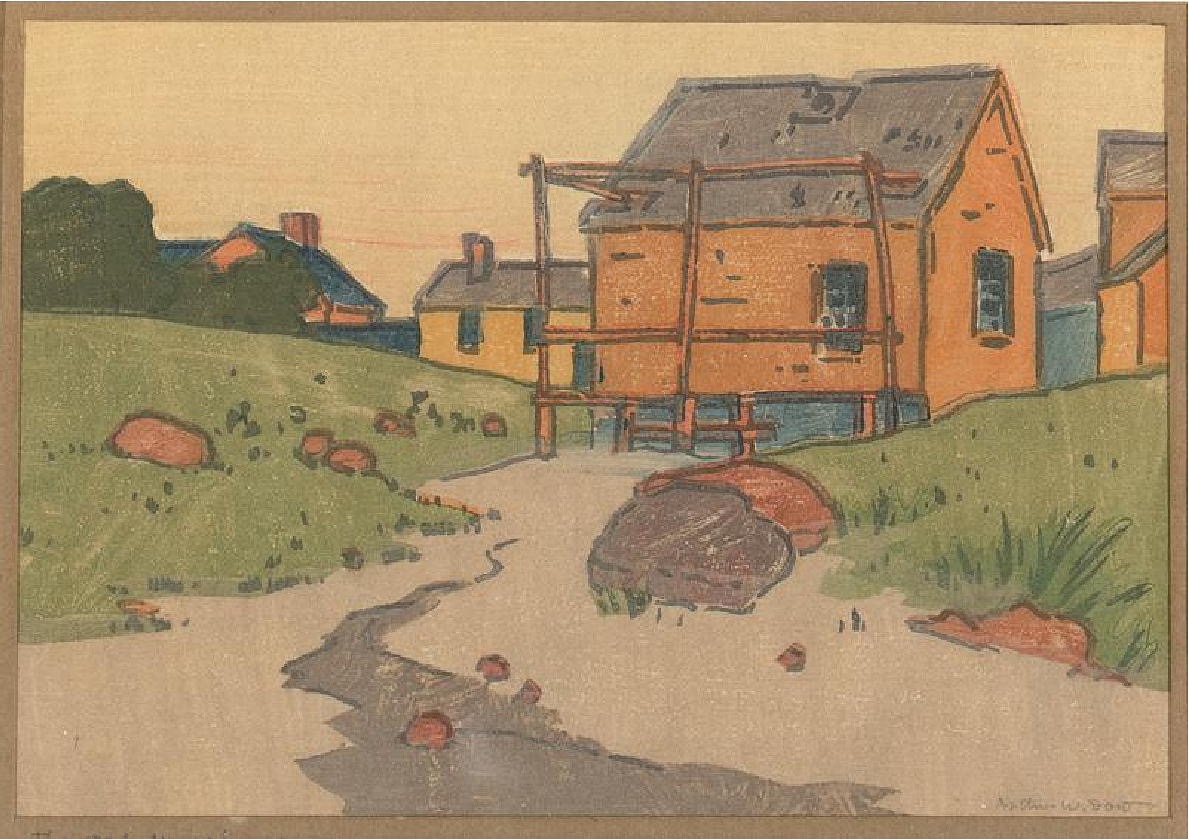
Arthur Wesley Dow: The Clam House (circa 1892)
"This so-far mythical future house concert …"
Much of my effort to resurrect my SetList of songs probably qualifies as inner work. Not to go all nineties on anybody, when the publishing world gorged in The Inner Work of pretty nearly everything, the inner work of performing even my simple tunes proves daunting. The inner world, my inner world, refuses to cleanly translate into outer mediums and contexts. Feelings repeatedly fail to pass the explicit test. Meanings steadfastly remain mysterious. Even hearing what I'm singing proves complicated and seems best amended with microphone, headphones, and a confusing array of software filters.
I've been failing to learn the software through which I filter my voice for twenty-some years and I feel no closer to figuring it out than when I started.
SurfacePrep
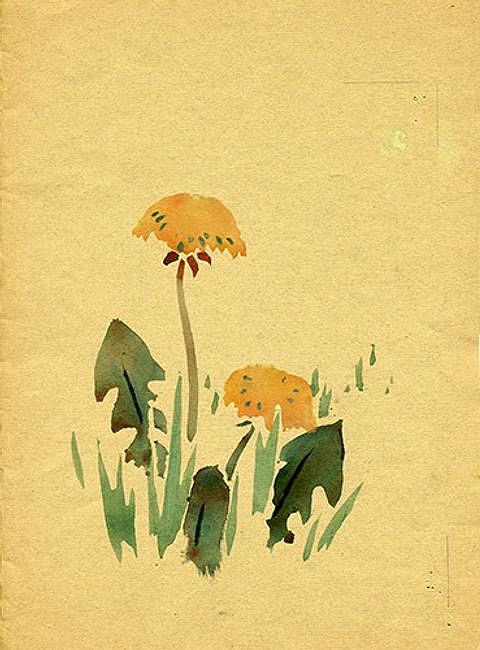
Arthur Wesley Dow, Pencil Proof (early 20th century)
"Great inconvenience can be tolerated to ease the prep."
Yesterday's SetTheory story, SurfaceTension, only introduced a topic key to my navigating through to finally produce my performable SetList. New readers should understand that I'm just shy of two months into an effort to resurrect a set of my own compositions into a performable set of songs such that I might perform a house concert around the upcoming Solstice. I've been introducing here the songs I'm considering including and following my process for preparing, which doesn't always seem very much like a process at all. Yesterday's story reported on the barriers to entry I encounter when I attempt to enter the once-familiar singer/songwriter space. The door does not seem wide open. I bump into encumbrances. I recognize these for what they are, completely normal, but I'm feeling a need to more deeply explain what I'm learning about overcoming these.
Upon closer scrutiny, I perceive some commonality between what I'm experiencing resurrecting my songs and what I came to understand about managing projects, back when I worked as a project management consultant.
SurfaceTension
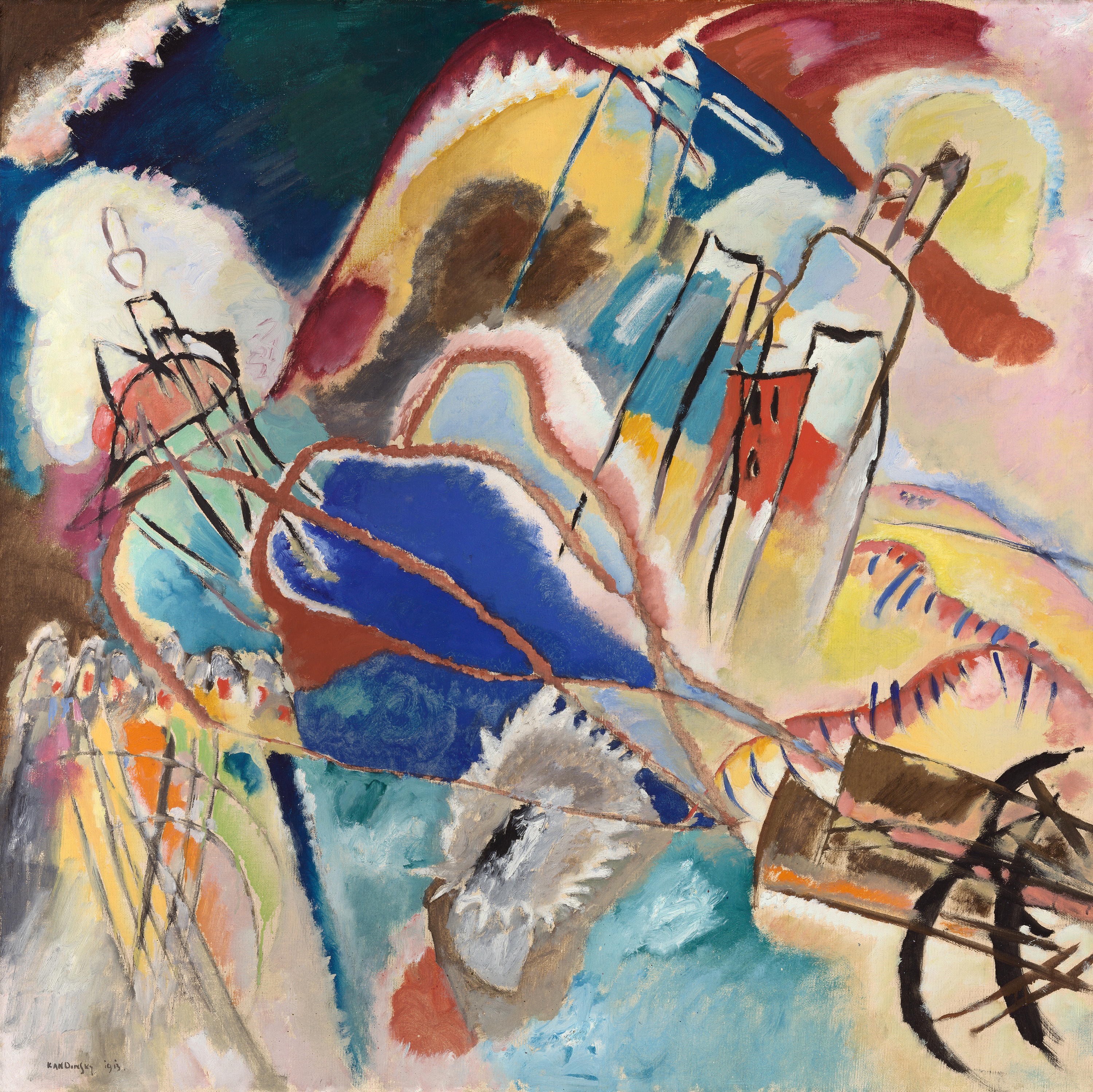
Vasily Kandinsky: Improvisation No. 30 (Cannons) (1913)
" … results that I still feel certain anyone can see through."
Each fresh task seems to carry a certain SurfaceTension which I must penetrate before I can fully engage. While the act of penetrating that tension might look like I'm engaging, it seems much more tentative than that, as if whatever effort I expend breaking through that barrier doesn't count. Indeed, that work often seems a distraction, an irrelevance. It seems to prevent me from getting started rather than an integral part of starting. I very often find myself stymied by these initiation rituals in precisely the same way that I often cannot determine how to open a package or penetrate the bullet-proof plastic shell covering a new purchase. I cannot open these things with bare hands. Scissors usually prove useless, too. I most often submit these to The Muse for resolution, since she seems to have developed specialized strategies for opening these. I most often prefer to just set them aside as not having been designed for my use. I'm easily discouraged.
I reflect on my academic career, such as it was.
Excusing

Martin Schongauer: Saint Sebastian (c. 1480-1490)
" … everything I accomplished will become roughly equivalent to everything I ever wanted."
Two years and eight months into the Covid-19 pandemic, I've grown expert at Excusing. I understand the limitations that this damned pandemic places upon The Muse and I. I probably understand them too well, for while most of my contemporaries, colleagues, and friends seem to have moved on and back into what now passes for ordinary times, I remain steadfastly tied to wearing my mask, anti-social distancing, and, basically, turning down the opportunity to do much of anything. I'm still not eating out. I find disturbing the prospect of ever flying again. Oh, I also have somehow managed to avoid contracting Covid. In short, I live my life immersed in considerable negative space, informed more by what I refuse to permit myself than in what I grant myself permission to engage.
I some days feel as though I've become a master at Excusing.
Marathons

Arthur Wesley Dow: Crater Lake (1919)
"We have only inadequacy to accompany us through."
As wearying as sports metaphors can get, I might best represent cancer treatment as a sequential series of Marathons, any one of which might well prove challenging and the sum total of which certainly overwhelms. No shortcuts exist. No respites, either. From the initial discovery through the diagnosis process took The Muse three full months. Once treatment started, which began with little respite from the exhausting diagnosing effort, the insults prove unrelenting. Radiation subtlety sears. Immunotherapy infusions invade. No places to hide emerge. It's one hundred percent exposed, day and night, through the treatment period, which is scheduled from the outset: five weeks of radiation at six treatments per week and six immunotherapy infusions, one every other week for eleven weeks. Next, an indeterminate period of recovery where The Muse's body will work to rediscover all the facilities wounded in healing. It's all grueling.
If food tasted decent.
InconviencingMyself
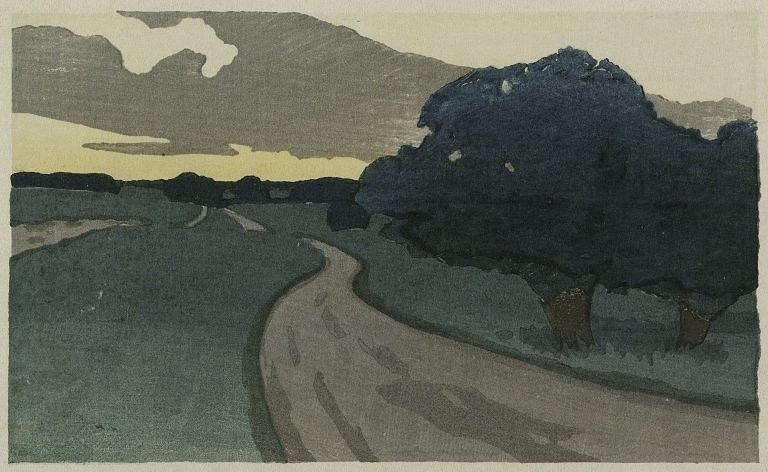
Arthur Wesley Dow:
The Long Road--Argilla Road, Ipswich (1898)
An Inconvenient Time
"It's An Inconvenient Time to cross a line,
An Inconvenient Time to be opening any new cans of worms
'cause me and my sanity have just settled into familiar scenery
and love is the last thing on my mind:
An Inconvenient Time."
I find myself very near the bottom of my tentative SetList.
Rest

Arthur Wesley Dow: Boats at Rest (c. 1895)
" … the tacit component of the effort."
Avant Garde composer John Cage famously insisted that silence comprised the essence of music, that the notes only exist to space the silences. It's easy and seductive to focus solely upon the overt pieces of a composition when preparing to perform it, but its silences significantly contribute to whatever presence it might ultimately induce. Likewise with stories. I once published a story which featured no spaces between the words. Using this technique, I was able to present something on the order of 40% more letters on the page, but while it was certainly possible to read the result, the reading felt tedious and unrewarding. The purpose of writing was never intended to see how efficiently it might employ paper. Hoarders never seem to catch on that much of the satisfaction of owning something comes from the ability to stand a few steps away and admire it. An overstuffed closet might just as well contain nothing.
I sat this morning to begin my daily writing ritual and felt for a fleeting moment as if I'd been there before.
Noughting
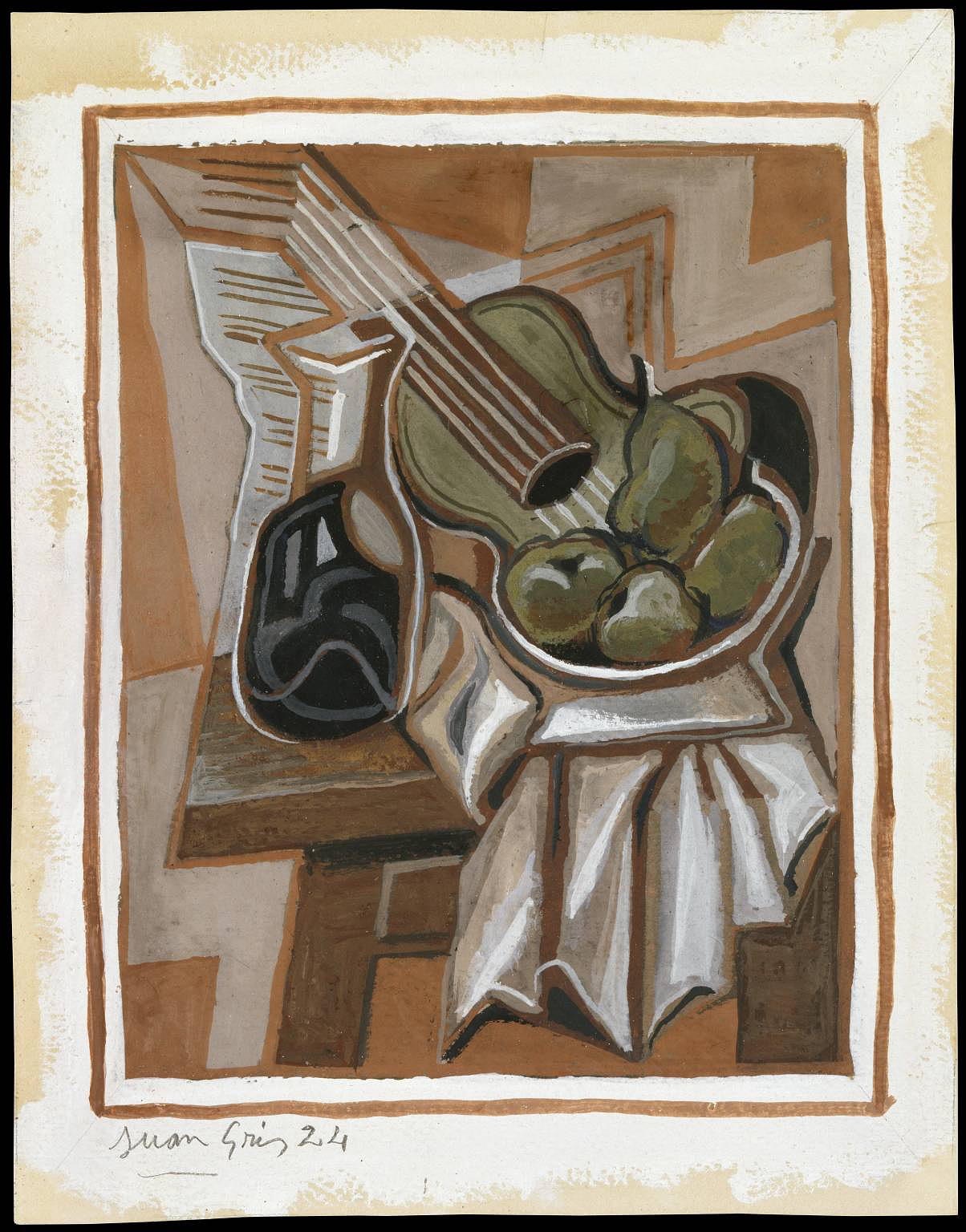
Juan Gris: Nature morte cubiste à la guitarem (1924)
"I find that tension thrilling …"
I'm not just a songwriter, but also somewhat of a guitarist. Not the kind commonly seen accompanying jazz bands, fretting hand all over the neck, fingers impossibly limber, intimately familiar with a hot half-dozen forms for even the most intimidating chords in every key. I use my guitar rather more defensively. It stands between me and my audience, a wooden fence I hide behind. I do okay but aspire to play no better. I accompany myself and I struggle wherever I attempt to get too fancy. I think of myself as primarily a lyricist, certainly much more than a guitarist. I'm a single acoustical act because I'm really not fit to play with anybody else. I keep my own tempos. I play exclusively my own songs. Consequently, I might be the only one who knows how to play along or when I play one wrong.
I became a curious kind of performer, one who'd always much rather not be the center of anyone's attention.
Prospector
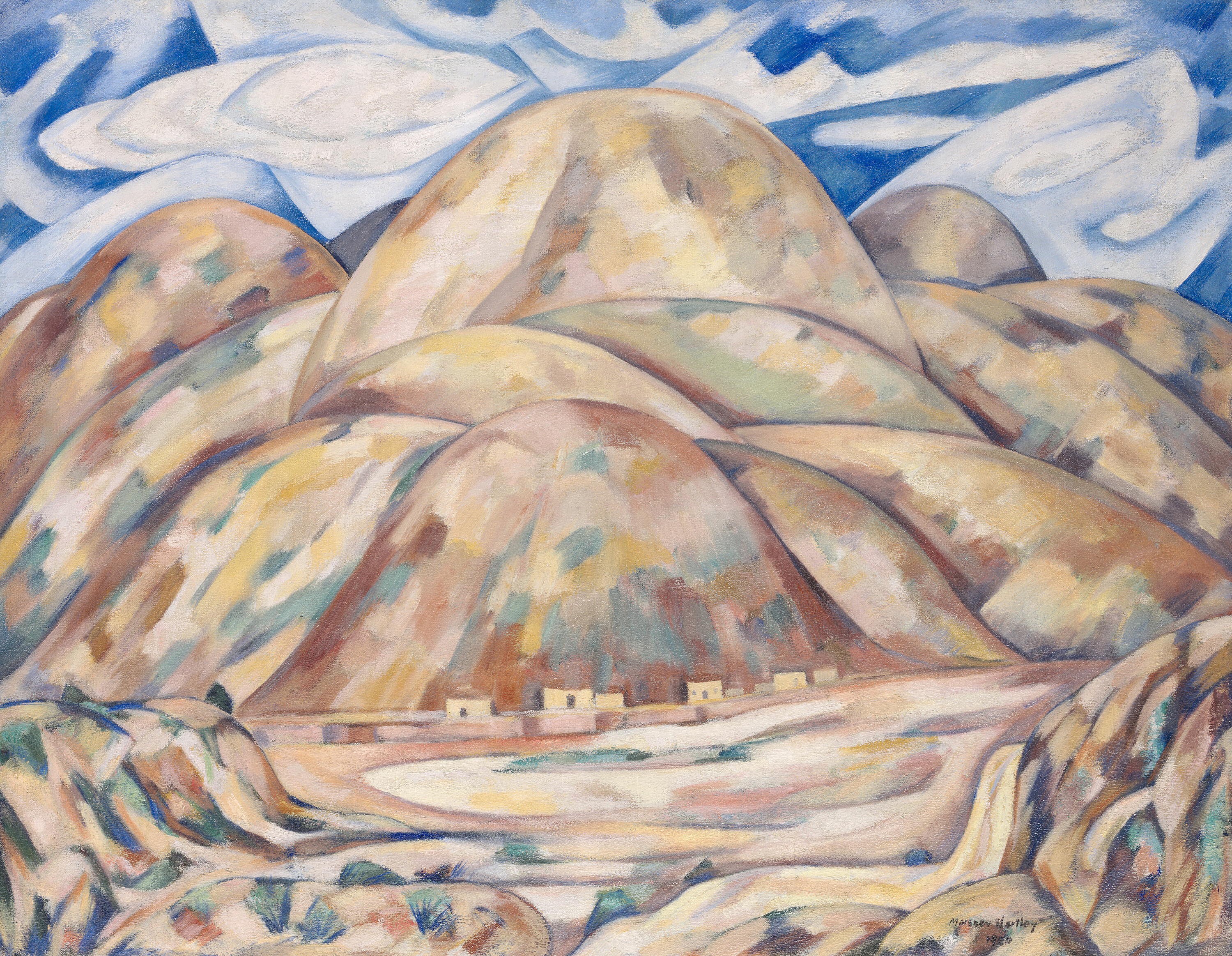
Marsden Hartley:
Landscape No. 3, Cash Entry Mines, New Mexico (1920)
"I have been the one creating that world."
Jeremiah
"Jeremiah's just as wiry as the sagebrush.
He built his home out on the desert sand.
Just a toothless old fool with a mangy mule beside him,
and a scrap of worthless parchment in his hand.
But Jeremiah says he doesn't mind his neighbors,
'course he's the only living soul for miles around,
With fifty-five years behind him in the Arizona sun,
searchin' out that old Lost Dutchman's claim."
Most of my songs seem autobiographical in that I serve as the obvious protagonist.
TheWaitingGame
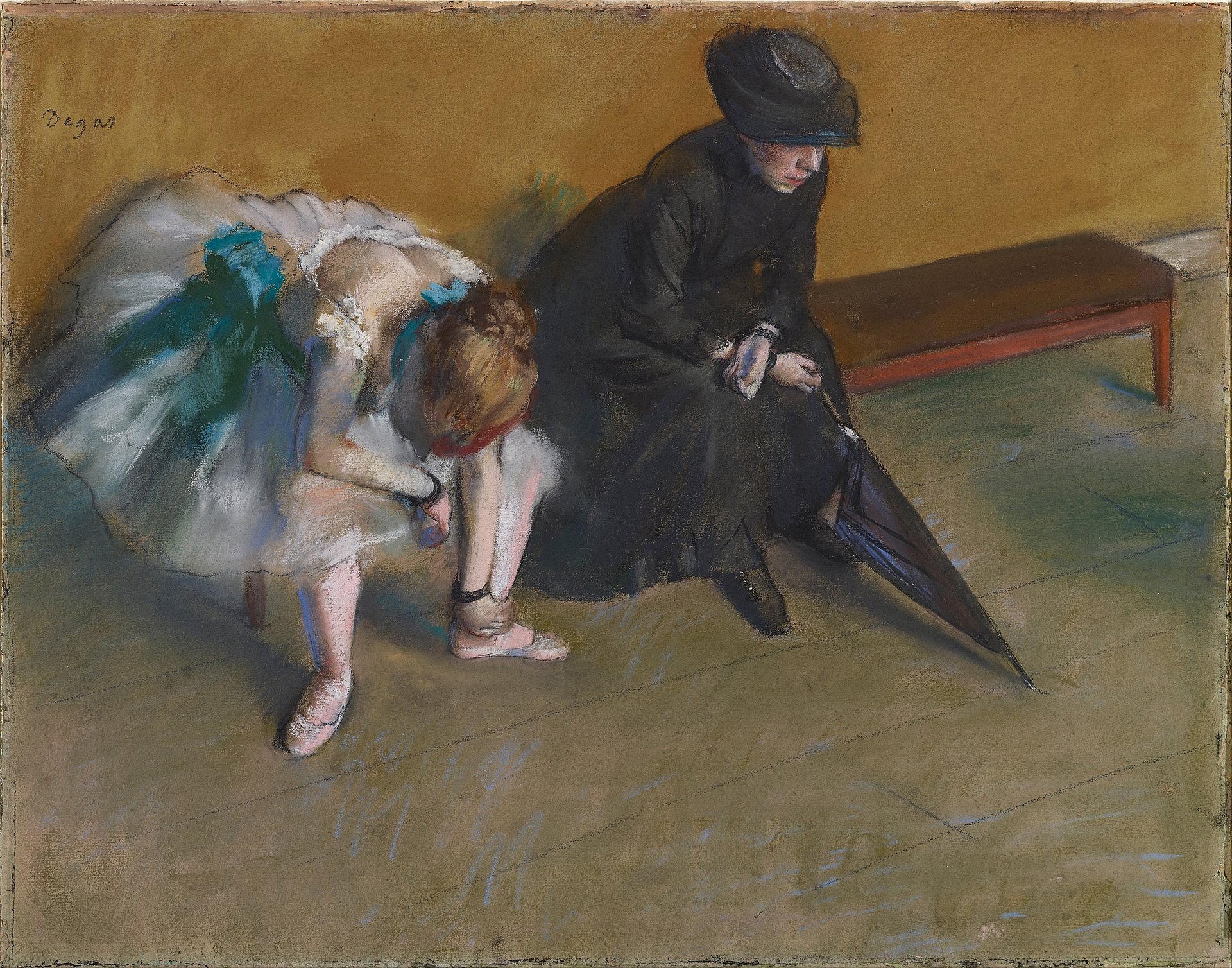
Edgar Degas: Waiting (c. 1880–1882)
"My juggling of the spaces in-between …"
Only one essential game exists: TheWaitingGame. This requisite game comes imbedded within every other game, within every occupation, whether it's considered a game or not. The one element of every engagement certain to appear before it's finished, TheWaitingGame seems anything but integral. It seems more like a waste, far worse than fallow, yet it certainly must be something other than mindless idleness. Why else would it appear universally, regardless of culture, regardless of time, age, or intelligence? The stupid receive their ration right along with the smarties. The handsome as well as the ugly, no exceptions granted. No exclusions.
My efforts to resurrect my songs and create a performable SetList feature much annoying idleness.
ChanceEncounter
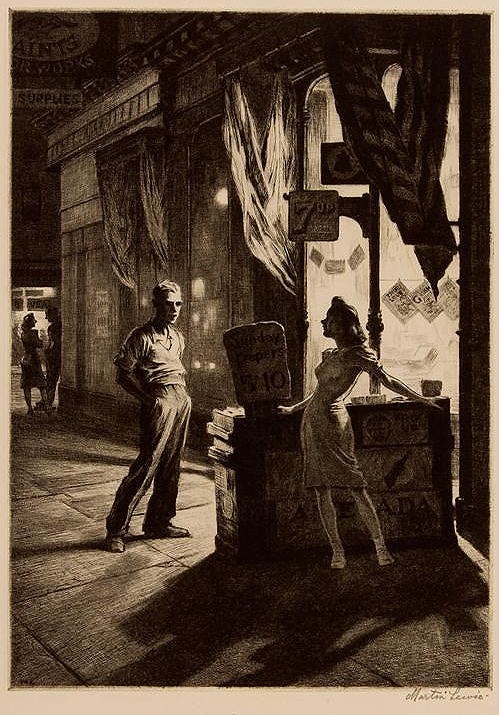
Martin Lewis: Chance Meeting (1940-41)
" … the good kind of double-damned bind."
Chance Encounter
"Let’s hear it for the Chance Encounter,
Let’s sing the praise of unplanned design;
‘Cause she’s always there keepin’ an eye on,
Unlikely you’ll leave her behind.
More unlikely, she’ll leave you behind …"
I fancy myself a great believer in the ChanceEncounter.
Twenty-fiveDown
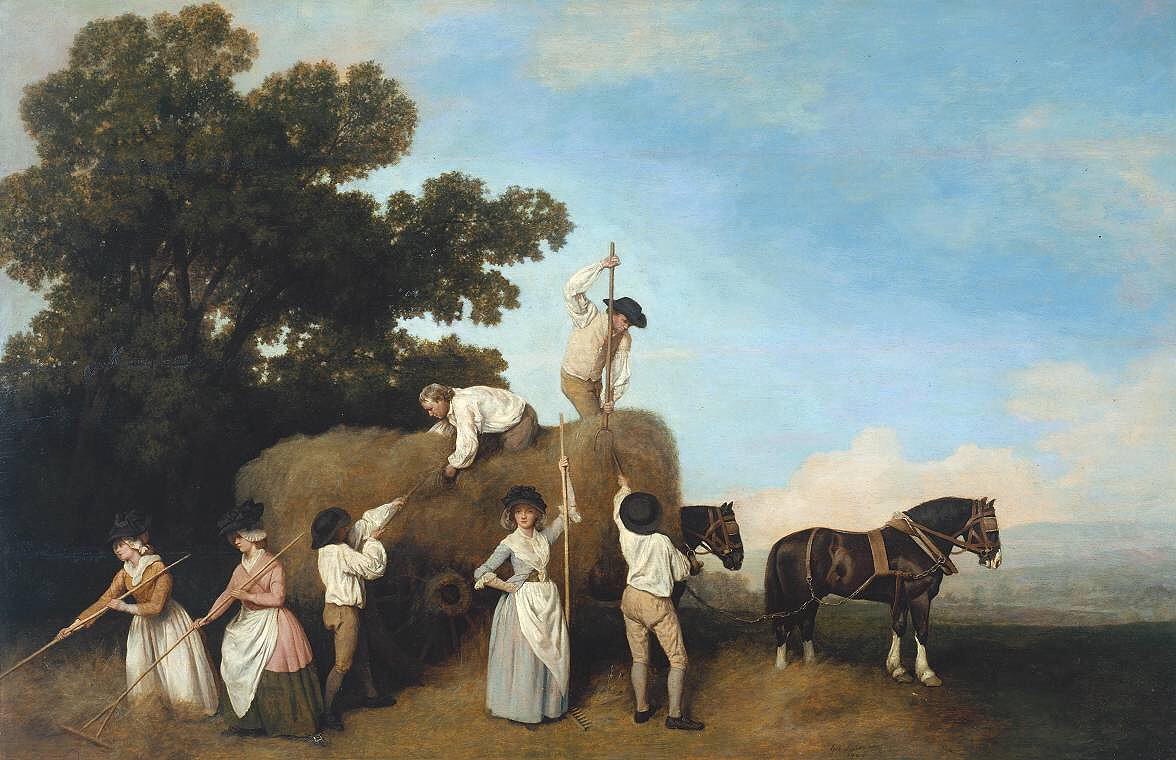
George Stubbs: Hay-Makers (1785)
"We've both come close to exceeding our patience, waiting."
"Twenty-fiveDown and five to go," The Muse whispered as she returned to the impossible puzzle on the side table in the radiation waiting room. She swore that she'd finish that puzzle by the time she'd completed her thirty dose radiation therapy, and she was down to the last week. Reduced to whispering now and without losing even an odd ounce of weight, she was entering what both of her oncologists had predicted would be remembered as her Hell week. Well, this week and the next, since the radiation continues cooking her cancer and her system for at least a week after the final application. Throat raw and increasingly exhausted, she still insists that she's feeling much better than she'd expected, and much better than almost any other cancer patient feels at this point in their treatment.
In that waiting room, there are never any exuberant patients or Emotional Support Animal spouses or children.
Entropying

Unknown artist-Central Tibet, mid 15th Century:
Tsong Khapa, Founder of the Geluk Order
(c. 1440–1470)
"May I never learn better."
Each season change brings a fresh disorder into focus as the reigning arrangement suited for the receding season falls out of fashion. What served as orderly then, now only appears disorderly and in need of cleaning up. Which of the infinite choices might suffice for order this time? The possible arrangements hardly approach the infinite, and seem limited by practical factors. I have limited time and perhaps even more limited imagination. The disorder seems powerful, for it disables significant portions of my imagination. I acquire a blindness to certain potentials and affinities for the familiar. I am as a result not so much ordering or even re-ordering, but Entropying: aiding and abetting a continuing disorder, rearranging deck chairs, blithely unaware.
I'm realizing that the disorder I found when I started poking into my songbook probably resulted from an inevitable.
MellowCat
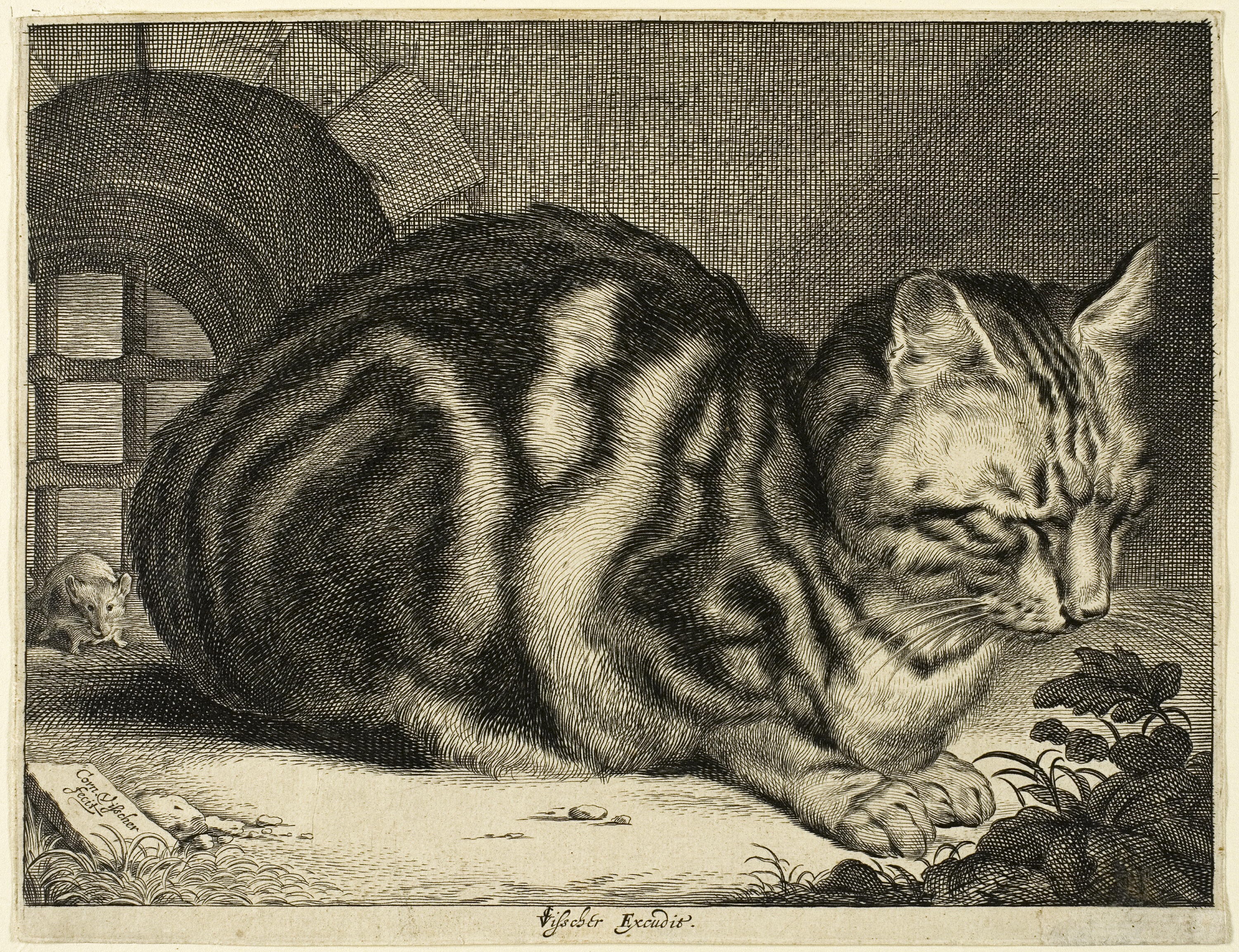
Cornelis Visscher: The Large Cat (1657)
" … I have no idea from precisely where this one came."
Me and My Mellow Cat
"Winter, my life is moving slow.
My dreams have turned into yesterdays
with no place left to go
and so I find myself
on this dark side of the sun,
just tryin' to find the ones I used to be."
I despise my anticipation of winter more than I've ever actually reviled the season in practice.
Founding
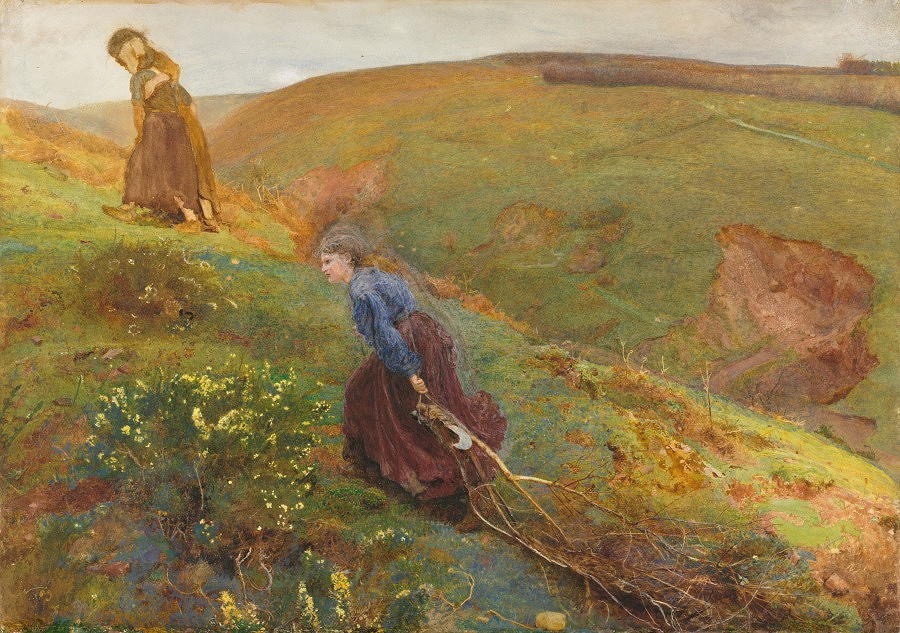
John William North: The Wood Gatherers (1869)
[Herbert Alexander, the artist’s biographer, described the artist’s interpretation of nature as similar to that of a poet, suggesting rather than describing: "In watercolor and oil an effect of intricate detail is found on examination to be quite illusive—multitudinous form is conjured by finding and losing it in endless hide-and-seek till the eye accepts infinity." from The Cleveland Museum's description of this work.]
" … as if my life might really have a purpose."
My songs seem to experience the most remarkable life cycle, for I've lost each after completing them, then found and resurrected some after they've spent some period essentially wandering in wilderness. Many still remain there. Had I not resurrected them, they would have most certainly been lost to the ages, as if they'd never existed, and they might well yet be lost, for this cycle most likely continues well into the future. My legacy, such as it might be, will probably be more determined by chance than by deliberate intent. I'm uncertain, anyway, what form a legacy might take and how I might set about to form one, if I was disposed to even attempt such a feat. My tunes have faded out then back into fashion. This might just be their nature, and mine.
Through the first part of this series, I noticed myself chewing on myself for losing the songs.
Fretwork

Frans Hals: Jester With A Lute (c. 1620 - 1625)
" … only I could ever punch the ticket I was holding …"
Little suggests that I possess my superpower. No spandex® suit, thank heavens. No special badge. Like anyone, I appear unremarkable, just another face in the crowd. Yet I believe that I possess a real gift, but one so subtle and unobservable that even I often overlook its presence. It's taken this concerted effort to produce a SetList and preparing to perform a house concert to surface this gift. Real guitar players culture their fingernails until their picking fingers become fingerpicks, darned near indestructible. Not I. Every guitar player develops calloused fingertips on their fretting hand, and often, as in my case, that hand grows a mite larger than its counterpart from constant stretching through the decades. Other than those fingertips and the outsized hand, nothing suggests that I'm a songwriter, and those aren't definitive tells, since not every guitar player writes original songs.
Songwriting's a presumed skill, one that's really only present in any verifiable form after the work's done and the purveyor becomes one who has written, but even then, the evidence of that ability won't be in evidence, not even to the scrupulous eye.
Journaling

Pierre-Auguste Renoir: The Apple Seller (c. 1890)
" … we're each much more complicated than we appear …"
I find myself feeling extremely grateful for the songs I've written over the years. Rediscovered, they seem to represent a curious form of Journaling, diary entries made without the author intending to catalogue his experiences. Yet, replaying each song seems to reliably resurrect the times and places within which it came into being. I have been revisiting those times and those places as I recover these songs. I realize that my experience has been much more diverse than it formerly seemed as though it had been, for I suppose that nobody ever carries many details of where they've been and who they were before. Our memories summarize, favoring brevity and so-called representative snippets. We might remember an encounter without really recalling how it felt, for instance. My songs seem capable of resurrecting feelings to produce a fully emotional remembering experience.
Earlier in my adulthood, I took to Journaling.
PaintMeAPicture
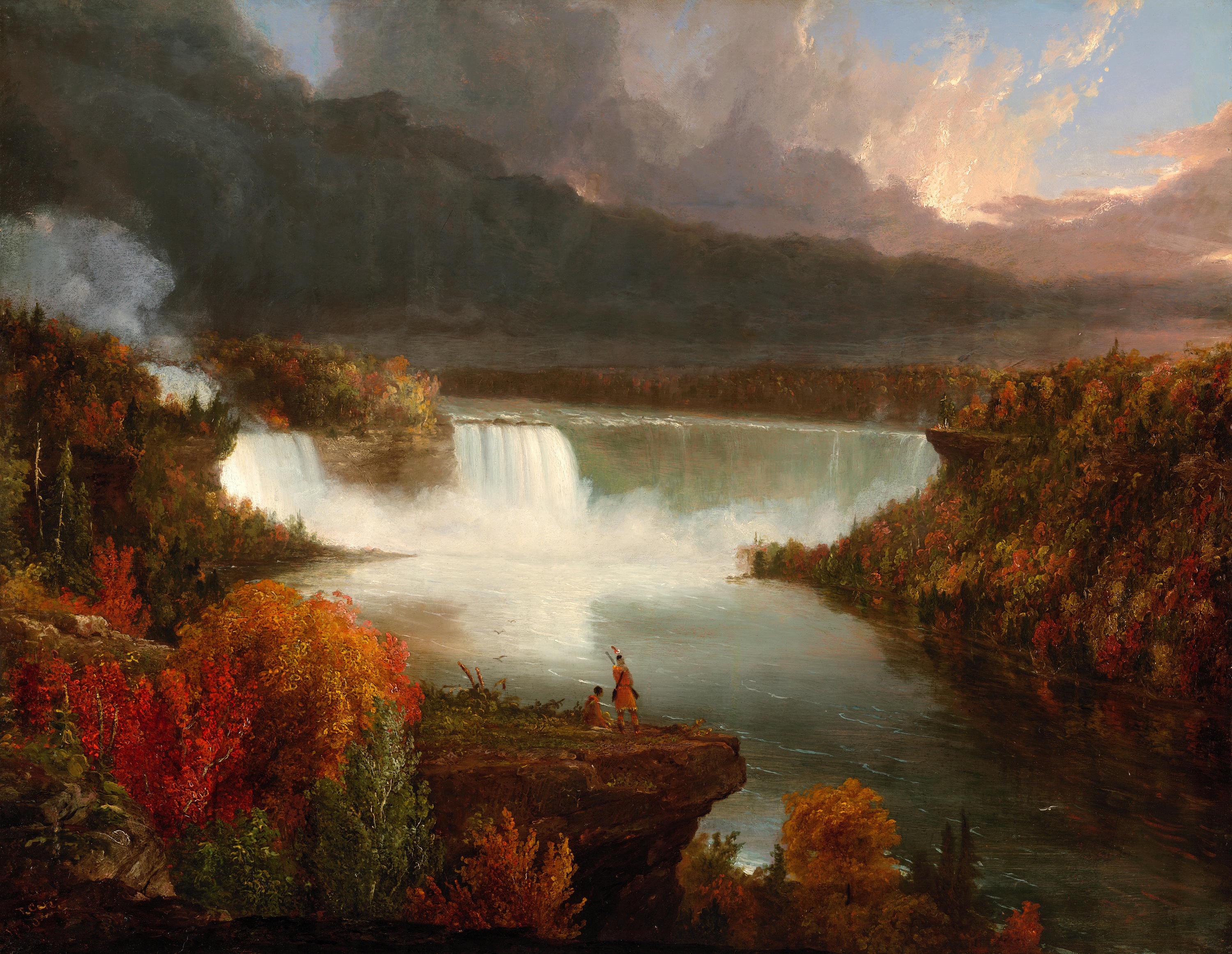
Thomas Cole: Distant View of Niagara Falls (1830)
" … the performer doesn't quite get it yet."
Paint Me A Picture
"I'm workin' my way through,
only two more sets to go and I'll be gone.
And the spotlight sees right through me,
but I don't think it shows, I mean I'm holding on.
'Cause I've been deceiving myself through the worst of it,
just hopin' to make the best of this someday.
Hey, hey!"
I began anticipating the end of my chosen career as a singer/songwriter several years before its actual demise.
Exemplary
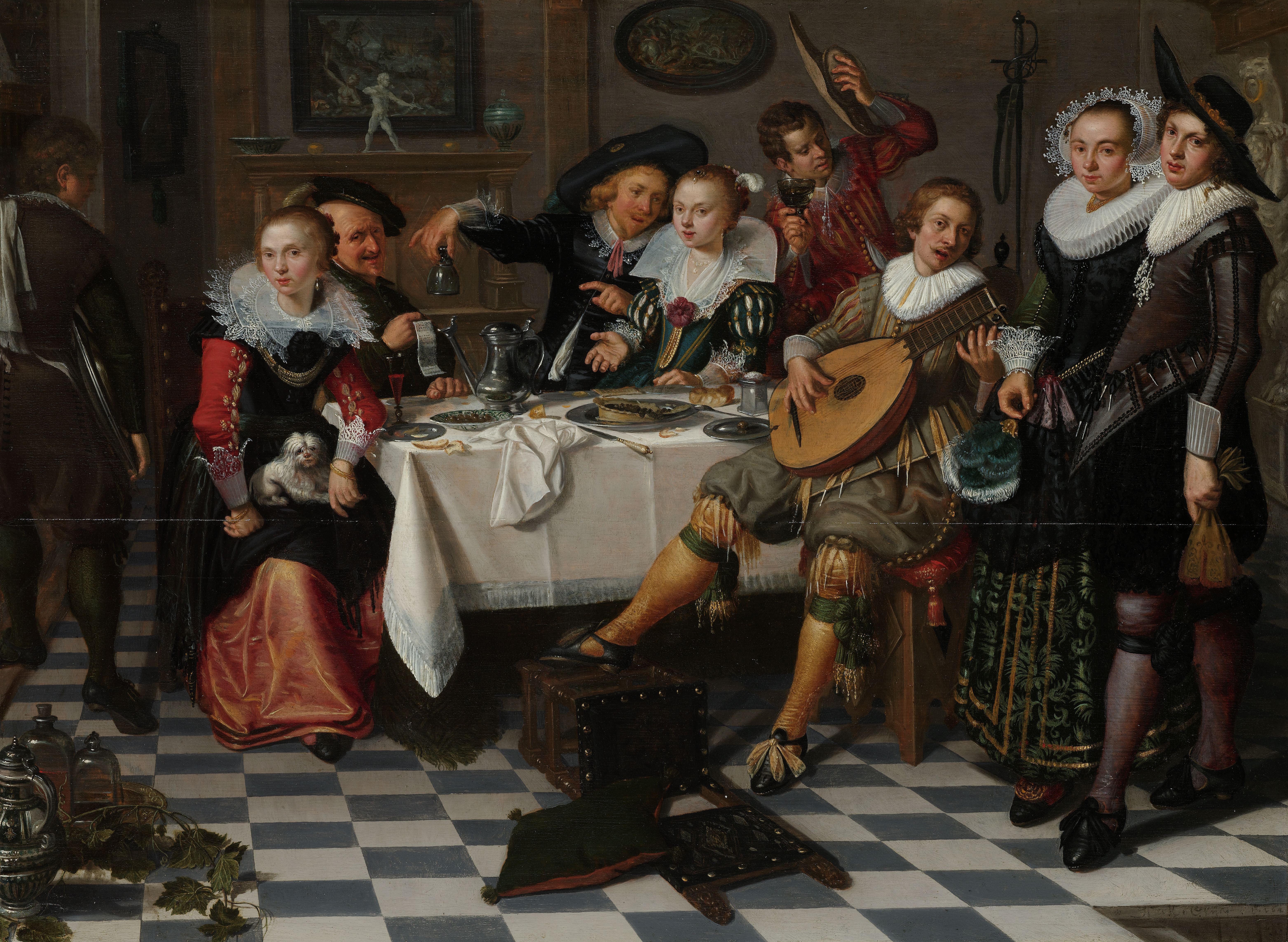
Isack Elyas: Merry Company (1629)
"She has not managed to bust out of any of the human condition on her road to recovery …"
The slow-baked yellowfin tuna in cream sauce featuring lobster mushroom and shallot seemed a decent choice for supper. The Muse had, after all, received two terribly reassuring assessments over the preceding week. We could afford to celebrate her headway. Her radiation oncologist had declared her progress through cancer treatment, "Great!" and her other oncologist had just that morning characterized her condition as she passed into halfway through her immunotherapy treatment regimen as "Exemplary!" Her progress could not have been better, but she found that she could not swallow the tuna entree. She fell back to the baked acorn squash with Bosc pear side dish. Even that, she swallowed reluctantly, the radiation treatments culminating in a rough, raw throat wherein her shrinking tumor still resides.
It's Tuesday, the morning when I deliberately set aside the primary focus of this series to update on The Muse's progress through her present bout with cancer.


